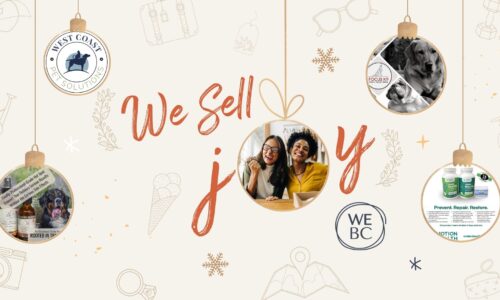Kate Bouchard, Loba Wellness, Vancouver
Vancouver
Growing up surrounded by small business owners, Kate Bouchard inherited a spirit of innovation and determination. What Kate considers her ‘inevitable’ leap into entrepreneurship started with her running her own marketing and branding company focused on health and wellness. Five years into that business, she noticed a gap in the health industry.
I saw a problem in the market around pill and supplement organization. It was just being targeted towards elderly people or polypharmacy end of life and completely ignoring the younger demographic of people who require support with their health and wellness and their supplement management.
Dealing with her own health challenges, such as fertility issues and hormonal imbalances, Kate recognized the need for a better solution for managing pills and supplements. Kate’s personal journey merged with her professional expertise in branding and healthcare to found Loba Wellness.
Some of these stats are actually mind-boggling: 50% of people under the age of 35 suffer with a chronic illness; one in six struggle with fertility; one in eight with mental health. A lot of that has to do with Women’s Health and the majority of Loba’s users to date have been women. With Loba, we really wanted to create a positive sentiment around taking your pills and supplements, especially for people who are struggling in these areas where there can be stigma.
Kate’s vision was to empower individuals to manage their health proactively through a streamlined pill and supplement organization system. Loba pairs with their app, allowing users to manage their schedule, set reminders, add pills, log information, track habits, and more.
People are turning towards more integrated care and naturopathy. They’re really being the steward of their own health, so our audience is investing proactively in their own healthcare and a lot of them are of a younger demographic.

After developing a relationship with WeBC through their business loan program, Kate was encouraged to join the Investor Speak™ program, where she found invaluable resources for pitching and handling investor questions.
WeBC’s Investor Speak™ program helped her improve her communication skills and secure more follow-up meetings with investors. This strategic support proved instrumental as Loba Wellness expanded its reach and impact.
Today, Kate continues to drive Loba Wellness forward, aiming to forge partnerships with B2B enterprises and supplement companies to enhance health management and promote holistic wellness practices.
Client Q&A
Q: What inspired you to start Loba?
I’ve always been interested in more integrative approaches to health and bringing Western and Eastern medicine together to try to achieve the best possible health outcomes for myself and the people around me. Acupuncture, massage therapy, energy work, and of course, supplementation are all very interesting to me.
On a personal level, I was dealing with women’s health issues, including polycystic ovarian syndrome and uterine fibroids. I worked with my doctors and began looking into naturopathy and these other modes of health and alternatives to try and sort out my health.
All of this was the catalyst of my own need for a management solution where I could organize my pills for the week ahead, and not have to take an entire week’s worth of pills with me to dinner to be able to stay consistent.
I wanted something that looked beautiful in my space because I didn’t want something on my counter that made me feel like something was wrong with me. This was crucial for someone like me, deeply invested in health, wellness, and aesthetics. I decided to incorporate my personal needs with my experience in health and technology.
We found a way to incorporate technology and what we know about the psychology of building healthy habits into the solution that ultimately became Loba.

Q: What is the biggest lesson you’ve learned being an entrepreneur?
I’ve always understood the importance of resilience in entrepreneurship, but starting a successful service-based business was a different challenge altogether. Transitioning to a tech startup with both hardware and software components added another layer of complexity.
The ecosystem is much more challenging and demands even greater resilience and grit, especially as a woman entrepreneur.
You hear about funding opportunities and venture capital for women entrepreneurs, but you don’t really understand how big that gap is until you’re living in it.
Learning to prioritize resilience and grit, and building strong support networks and sustainable practices, have been my biggest learning.
Q: What inspired you to take the Investor Speak program?
As a client of WeBC through their loan program, I developed a relationship with their team. It was during my second meeting with Melanie Rupp that I first learned about the Investor Speak™ program. After she contacted me, I decided to apply for the second cohort.
Building relationships with the team at WeBC made me feel understood, especially regarding the challenges women entrepreneurs face. When they recommended the program to me, I felt confident they had my best interest at heart. I knew participating would be worthwhile.
Q: Were there any key takeaways from the program?
The platform and technology were so helpful for my learning. Being able to go on and practice not just our pitch, but how to handle questions and objections from investors was the most valuable thing for me as a part of that program.
We were able to actually practice live, then read back transcripts and have our responses scored based on whether we used aspirational words, objection words, positive language, or negative language. It was really helpful in both affirming how I’ve handled Q&A in the past, but also flagging things and helping me to train them out of my language.
I was in the program at a time when I was pitching very actively—three to five pitch meetings a day. The learnings from that program directly contributed to my success in securing second and third meetings with investors, and move beyond the initial intro calls.
The biggest learning for me was understanding the psychology of language when it comes to what investors are looking for. It’s much more specific than one might think in the use of certain words and certain terms which typically result in more investment. Having access to that data to inform my responses and how I pitch was a big takeaway.
Q: What advice would you offer aspiring entrepreneurs looking to launch their own business?
My advice for someone starting their own business would be to be very clear about their purpose and have passion for what they’re doing. At the end of the day, the problem that you’re trying to solve is going to get you through the hard times. Always realign with your purpose and look at the bigger picture of the impact that you can have as a business.

Where to find Loba Wellness




